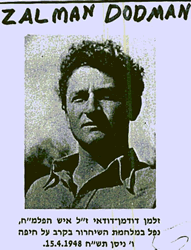
Return to Vishnevo Stories Menu
For my brother Zalman Dudman Dudayi,
the son of Aron-Zvi and Miriam Dudman. (Translated by Eilat Gordin Levitan and
Gil Benjamin Villa)
My brother was born in Vilna on August 12, 1925. He was educated in Vishnevo
and had a very tough childhood. When he was 7-and-a-half he lost his mother
and in 1936 he immigrated with his father to Israel. His education was in a
children’s home in Ramatgan, from there he studied in Bilu in Tel Aviv
and from there he went to the agricultural school in Mikva Israel. When he finished
his studies in 1942, he joined the Palmach (the army). Everyone loved him, both
the people that commanded him and the people he commanded since he was honest
and easygoing and brave he went through every dangerous situation with modesty.
In 1945 he was released from the Palmach and returned to Tel Aviv but continued
participating in defense missions. 1946 was a very important year. I arrived
in Israel, his only sister who survived the Holocaust. It had been ten years
since we had seen one another. Ten awful, dark years for me. The first meeting
symbolically was in the dark. Maybe he chose it so he wouldn’t see the
tears that kept coming. The meeting was very special. We spoke the entire night
as if a dam had been opened, so was his heart and his soul opened all of a sudden.
Since that day we were very, very loving and close to one another. Here for
the first time he told me that he wanted to have a large family with many children
and to fill their lives with love.
He always tried to hide his activities in the Chagana, which was dangerous,
so I won’t try to stop him. During those days he continued his education
and in the evening he would go to the university in Tel Aviv. He was especially
interested in botany. He was planning to go to the US to continue his studies,
but fate dealt him another hand. One day he was stopped by the British and sent
to Rafia. After a month he was released but now his dream of studying had to
be delayed. As a member of the Palmach he immediately, with the first troubles
in 1942, volunteered for service. He had excellent military skills and took
part in the Battle of Yazu and later on would take missions to protect the food
that was sent to Jerusalem when the city was blockaded. When the road was closed
he found himself without much to do. He transferred himself to a special brigade
that fought in the area of Haifa. His spirit was very good until his last days.
Defending his country filled his whole being, but it seems that just before
the last battle he felt something as if his heart told him that these were his
last hours. The entire night he talked with his commander, telling him about
his childhood, about his mother’s face that he remembered less and less,
about his little sister that just returned from hell, from Auschwitz and how
he must support her and be a friend and advisor to her. The next day, on the
15th of April, 1948, he was at the head of the brigade that fought to free Haifa.
It was a very tough battle. They fought from house to house, and finally when
it seemed like Haifa was freed, he was shot and killed. That day he was brought
to his eternal rest to a military cemetery in Haifa. His death was a terrible
shock to his father, his relatives, and all his friends, and to me, his only
sister who for a short time had light in my life. I met my brother again, and
when this light darkened, days of mourning without salvation came.